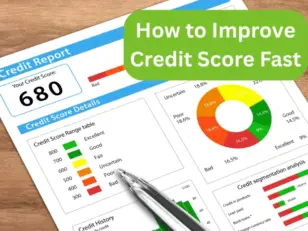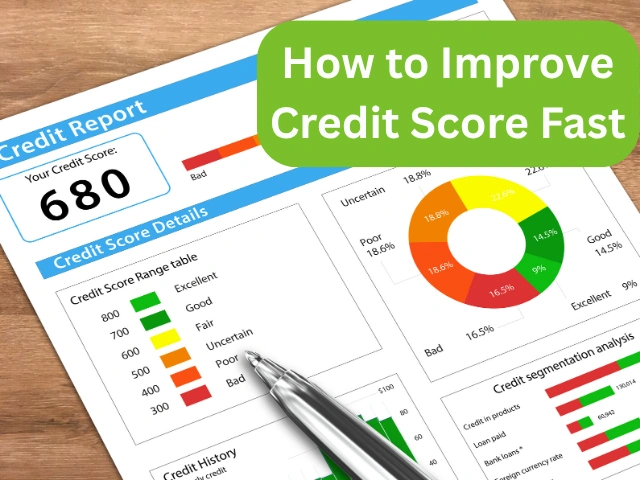Learn how to improve credit score fast in the USA. Understand what a credit score is, why it matters, and the key factors affecting it.
Your credit score is one of the most important numbers in your financial life. Whether you are a student, young professional, or just starting out, knowing how to improve credit score can save you money, unlock better loans, and even affect renting or job applications.
A higher credit score can help you:
- Qualify for lower interest rates on credit cards and loans
- Get better terms on mortgages or auto loans
- Improve your chances of approval for apartments and rental agreements
- Save on insurance premiums in some states
In this guide, we’ll break down exactly how to improve credit score fast using proven strategies, tips, and actionable steps.
What is a Credit Score?
A credit score is a numerical representation of your creditworthiness. In the USA, it usually ranges from 300 to 850. The higher the score, the better your credit health looks to lenders.
There are several types of credit scores:
- FICO Score: Most commonly used by lenders for credit cards, loans, and mortgages
- VantageScore: Another scoring model used by some financial institutions
Credit scores are calculated based on your credit history and financial behavior, reflecting how responsible you are with borrowed money.
Why a Good Credit Score Matters
- Lower Interest Rates: Higher scores often mean you pay less interest
- Better Loan Approvals: Lenders trust borrowers with good scores
- Financial Freedom: Easier access to credit when needed
Factors Affecting Your Credit Score
Understanding what affects your score is the first step toward improvement.
1. Payment History (35%)
Your record of paying bills on time is the most important factor. Late payments, missed payments, and defaults lower your score.
2. Credit Utilization (30%)
This is the ratio of your credit card balances to your credit limits. Using less than 30% of your available credit is ideal. High utilization signals risk to lenders.
3. Length of Credit History (15%)
The longer your credit accounts have been open, the better. Even if you are young, keeping older accounts open helps improve your score over time.
4. Credit Mix (10%)
Having a mix of credit types — like credit cards, auto loans, and student loans — can positively impact your score. It shows lenders you can manage multiple forms of credit.
5. New Credit Applications (10%)
Opening too many new accounts in a short period can lower your score. Each application triggers a “hard inquiry,” which temporarily affects your credit.
Step-by-Step Strategies to Improve Credit Score Fast
If you want to improve credit score fast, following structured steps is essential. Here’s a roadmap:
1. Pay Bills on Time
- Your payment history makes up 35% of your credit score.
- Always pay at least the minimum balance before the due date.
- Set up automatic payments or reminders to avoid missed payments.
- Even one late payment can drop your score by 50–100 points in some cases.
2. Reduce Credit Card Balances
- Keep your credit utilization below 30%, ideally 10–20%.
- Example: If your card limit is $1,000, try to carry no more than $200–$300 balance.
- Paying down existing balances can improve your score within a few billing cycles.
3. Avoid Opening Too Many New Accounts
- Each new credit card or loan application triggers a hard inquiry.
- Multiple inquiries in a short time signal higher risk to lenders.
- Focus on managing existing accounts responsibly before applying for new ones.
4. Keep Old Accounts Open
- Length of credit history contributes 15% to your score.
- Even if you don’t use older credit cards, keeping them open shows a long-standing credit history.
- Closing old accounts can lower your average credit age, impacting your score negatively.
5. Pay Down High-Interest Debt First
- Focus on cards or loans with the highest interest rates.
- Reducing overall debt improves your credit utilization ratio.
- Consider the debt snowball or avalanche method to systematically pay off debt.
6. Use Credit Strategically
- Make small, regular purchases on your cards.
- Pay off the balance each month to demonstrate responsible credit usage.
- Example: Use a card for groceries or subscriptions, then pay off the full amount.
7. Monitor Your Credit Reports Regularly
- Check your credit reports from Equifax, Experian, and TransUnion.
- Look for errors or inaccurate information that could hurt your score.
- Dispute errors promptly to remove negative items quickly.
Common Mistakes That Lower Credit Score
1. Missing Payments
Even one missed payment can significantly reduce your score.
2. Maxing Out Credit Cards
High utilization signals risk, lowering your credit score.
3. Opening Multiple Cards at Once
Too many hard inquiries reduce your score temporarily.
4. Ignoring Small Debts
Even small unpaid balances can accumulate and negatively impact your credit.
5. Closing Old Accounts Unnecessarily
As mentioned, length of credit history is important—closing old cards shortens your credit age.
6. Relying on Minimum Payments Only
Paying only the minimum extends debt and may hurt your credit over time.
Quick Tips to Boost Credit Score Fast
- Become an authorized user on a parent’s card with good history.
- Set up automatic payments to avoid late fees.
- Diversify credit types gradually (credit card, student loan, small personal loan).
- Negotiate with creditors to remove late payment records (if eligible).
- Pay more than once a month to reduce reported balances and utilization.
Advanced Strategies to Improve Credit Score Fast
1. Use a Secured Credit Card
- Secured cards require a refundable deposit and are ideal for students or beginners.
- Responsible use can quickly build or rebuild credit.
- Example: Deposit $500, use the card for small purchases, pay off in full each month.
2. Maintain a Healthy Credit Mix
- Credit mix contributes 10% to your credit score.
- Combine different types of credit gradually:
- Credit card
- Student loan
- Auto or personal loan
- Lenders like to see you can handle varied credit responsibly.
3. Keep Accounts Open Long-Term
- Older accounts positively affect credit age, boosting your score.
- Avoid closing old cards even if you rarely use them.
4. Request Credit Limit Increases Strategically
- Increasing your credit limit can lower credit utilization, improving your score.
- Don’t increase spending—use it to reduce utilization ratio.
5. Dispute Errors on Credit Reports
- Obtain free reports from Equifax, Experian, and TransUnion.
- Correct inaccurate late payments, accounts not yours, or wrong balances.
- Removing errors can boost your score fast.
Real-Life Examples of Fast Credit Score Improvement
Example 1: Alex – The Responsible Student
Alex, a college junior, had a score of 620. He:
- Paid all bills on time for 6 months
- Reduced credit card utilization from 70% to 20%
- Became an authorized user on his parent’s card
Result: His score jumped to 720 in less than a year.
Example 2: Lisa – The Secured Card User
Lisa had no credit history. She:
- Opened a secured card with a $500 deposit
- Made small purchases and paid full balance monthly
- Monitored her credit reports for errors
Result: Built a 680+ credit score in 8 months, ready for an unsecured student card.
Example 3: Ryan – Debt Reduction Focus
Ryan had two high-interest cards maxed out. He:
- Paid down balances aggressively using the avalanche method
- Kept old accounts open
- Limited new applications
Result: Credit score improved from 590 to 710 in 10 months.
Expanded FAQs About Credit Scores
1. How long does it take to improve a credit score?
- Minor improvements: 1–3 months
- Major improvements: 6–12 months with consistent responsible behavior
2. Can paying off student loans improve credit score?
Yes, on-time payments improve payment history and show responsible borrowing.
3. Does checking my own credit score affect it?
No, checking your own score is a “soft inquiry” and does not affect your credit score.
4. Can being an authorized user help?
Yes, adding a student to a parent’s good-standing card can quickly improve credit.
5. Can disputes on errors really boost my score?
Yes, removing incorrect late payments or accounts not yours can increase your score in weeks.
6. How much credit utilization is ideal?
- Keep below 30% ideally
- 10–20% is even better for fast improvement
7. Should I close unused accounts?
No, closing old accounts can shorten your credit history and lower your score.
8. Can new credit applications hurt my score?
Yes, each hard inquiry may drop your score temporarily. Apply selectively.
9. How often should I monitor my credit?
- Check at least once per month
- Helps detect errors and track improvement
10. Can I improve my credit score without a credit card?
Yes, paying student loans, rent reporting services, and authorized user status can help.
Final Thoughts
Improving your credit score fast is possible with discipline, strategy, and monitoring. Key takeaways:
- Pay bills on time — most critical factor
- Lower credit utilization — spend smartly and pay off balances
- Keep accounts open and diverse — credit age and mix matter
- Monitor reports and dispute errors — remove negative items
- Use secured cards if necessary — build or rebuild credit safely
Remember, the “how to improve credit score” is not just about numbers—it’s about building financial responsibility, trustworthiness, and long-term opportunities.Start implementing these strategies today, and you can see noticeable improvement in months rather than years. A higher credit score opens doors to lower interest rates, better loans, and financial freedom.

